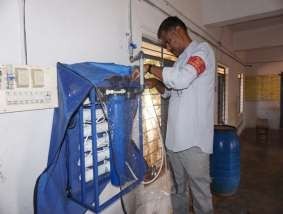


Empowering Rural Communities: The UBA Success Tale
The Directorate of Agribusiness Development (DABD) has been serving as one of the Regional Coordinating Institutions (RCIs) for the Indian Ministry of Education's Unnat Bharat Abhiyan 2.0 Scheme since March 2019. In its capacity as an RCI, DABD's role includes facilitating, guiding, and overseeing rural development initiatives undertaken by 204 Participating Institutes (PIs) within the central zone of Tamil Nadu. Specifically, DABD, TNAU, is responsible for supervising eleven districts: Coimbatore, Erode, Karur, Nagapattinam, Namakkal, Thanjavur, Nilgris, Tiruchirappalli, Tiruppur, Mayiladuthurai, and Tiruvarur. As of September 2023, around 1020 net work villages under RCI, TNAU, undergoing development activities in line with various UBA thematic areas under the oversight of RCI, TNAU.
One of our participating institutes, Bannari Amman Institute of Technology in Erode, has made a significant impact in the adopted village of Puduvadavallai, a tribal rural village, through the Unnat Bharat Abhiyan (UBA) scheme. This initiative has brought about substantial improvements in the lives of its residents across several key areas.
Access to Clean Water: The introduction of state-of-the-art Reverse Osmosis (RO) systems in village schools has ensured that students have access to pure drinking water. This not only enhanced their health but also increased awareness regarding the significance of clean water.
Menstrual Hygiene: To address concerns related to menstrual hygiene, sanitary napkin incinerators were installed in schools, providing a safe and discreet disposal solution. This effort also initiated crucial conversations about menstrual health.
Environmental Preservation: The village's aesthetics and environmental well-being received a boost with the strategic placement of waste bins, the renovation of ponds, and the removal of Seema Karuvelan trees (Zucchini).
Sanitation and Health: The UBA team conducted an extensive awareness campaign against open defecation, employing drama, street plays, and the establishment of a vigilance team within the village. These efforts significantly reduced open defecation practices.
Literacy Enhancement: A comprehensive literacy program categorized villagers based on age and existing knowledge levels. Digital literacy training successfully reached at least two members from each family, opening doors to education and information access.
Agriculture and Soil Health: Local farmers were provided with soil health cards and valuable insights from the Agriculture department to optimize nutrient management. This led to improved crop yields and sustainable agricultural practices.
Economic Empowerment: Through the UBA scheme, villagers received self-employment training in activities such as mat making, soap production and mushroom cultivation. With the necessary resources in hand, they were able to create these products and directly sell them to merchants. This not only boosted their income but also their self-confidence.
Today, Puduvadavallai stands as a testament to the transformative impact of the Unnat Bharat Abhiyan (UBA) scheme. It serves as an exemplary model of sustainable development, improved hygiene, enhanced literacy, and economic empowerment. This success story is a testament to the tireless efforts of the UBA team and the enthusiastic participation of the villagers, underscoring the UBA scheme's potential to drive comprehensive development in India's rural areas.